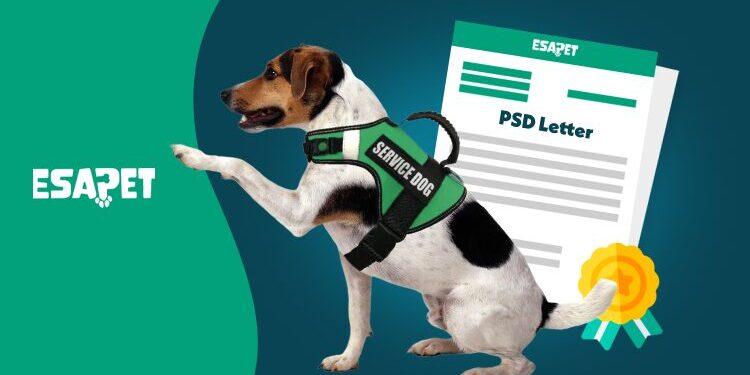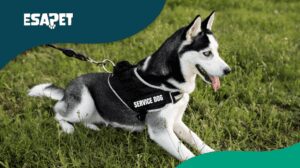Proof of Service Dog: How to Identify a Service Animal (2026 Guide)

Service dog verification is often misunderstood. Proof of service dog status is legally not required under the Americans with Disabilities Act (ADA). The Air Carrier Access Act (ACAA) regulates service animals during travel without demanding documentation.
These laws emphasize behavioral indicators and task performance to identify service animals. A key misconception is that service dogs must wear a vest, carry ID cards, or have certifications. However, having a PSD Letter can ease public interactions, even if not required in every situation.
The dog’s ability to assist with its handler’s disability matters most. Service animals are individually trained to perform tasks directly related to their owner’s needs. This training makes them vital companions in daily life.
Understanding Service Dog Proof Requirements
Businesses and organizations often misunderstand the legal requirements for service dog proof. Under the ADA, handlers are not required to show documentation or proof of their animal’s status. Staff can only ask two questions to verify a service dog’s legitimacy.
What the ADA Says About Service Dog Proof
The ADA prohibits requiring proof of service dog status. Businesses may only ask:
![]() Is the dog a service animal required because of a disability?
Is the dog a service animal required because of a disability?
What work or task has the dog been trained to perform?
These questions ensure privacy while allowing staff to verify the animal’s purpose. Requesting ID cards, certifications, or vests violates federal law.
Can You Legally Ask for Proof of a Service Dog?
No formal proof, such as certifications, is legally required for service dogs. The ADA prioritizes behavior and task performance over physical identifiers. A well-trained service dog is calm, focused, and responsive to its handler.
These traits are the most effective indicators of legitimacy. For specific situations, such as housing or air travel, documentation (like a psychiatric service dog letter) may be requested for convenience but not for proof.
Why Service Dog Status Proof is Not Legally Required
The ADA protects service dog handlers in places of public accommodation. Under this law, no proof or documentation is needed to access public places. This ensures equal treatment for individuals with disabilities and minimizes unnecessary barriers.
Some exceptions exist, like air travel and housing. In these cases, limited documentation is allowed to support practical accommodations. However, this is not meant to challenge the service dog’s legitimacy.
ADA Regulations Protect Service Dog Owners
The ADA ensures that service dog handlers can access public spaces without documentation. Businesses cannot demand proof, ID cards, or certifications to verify if a dog is a service dog. The law focuses solely on the dog’s tasks to assist its handler.
Businesses must allow service animals to go with their handlers in public areas without proof or documentation. This rule prevents discrimination. In a way, it ensures individuals with disabilities have equal access to services even in places with a “no pets allowed” policy.
Exceptions for Airlines and Housing
Airlines and housing providers follow extra rules under the ACAA and the Fair Housing Act (FHA). These laws allow limited documentation requests for practical purposes. This includes reserving space for a service dog or waiving pet fees.
Airlines may request a form stating the dog’s role in assisting with a disability. These documents are meant to ensure proper support during travel or housing arrangements.
Similarly, hotel laws for the accommodation of assistance animals state that they cannot charge an extra fee for service dogs, as they are not considered pets. This ensures service dog handlers are not penalized financially when seeking accommodations at the hotel.
What Helps Identify a Legitimate Service Dog Without Proof?
Legitimate service dogs are identified by their behavior and task performance. These factors prove their training and purpose, making them more reliable than physical identifiers like vests or ID cards.
Expected Behaviors of a Service Dog
A legitimate service dog’s behavior reflects its training and purpose. These dogs must remain composed and attentive, even in crowded rooms or unpredictable environments. Common behaviors include:
Common Tasks Performed by Service Dogs
Service dogs perform essential tasks to support their handlers. Each task is tailored to the individual’s disability, showcasing the dog’s training. Examples of tasks include:
Complete List of Service Dogs Tasks
Non-Required Documents Often Used for Convenience
Certain documents can ease public interactions or simplify access to accommodations. However, they are not legally required. These optional materials are often helpful in housing or air travel scenarios. However, they do not establish a service dog’s legitimacy.
Service Dog Prescription Letter
A Licensed Mental Health Professional (LMHP) issues a service dog prescription letter or a PSD Letter. This document is useful in housing or travel situations and helps confirm the dog’s role in supporting a disability.
It ensures compliance with housing laws like the FHA or travel regulations under the ACAA without requiring public access verification.
Service Dog ID Cards and Training Certifications
Service dog ID cards and training certifications are not legally required. However, they can ease public interactions. These documents may reassure businesses unfamiliar with ADA regulations.
Relying on unofficial online services that sell fake certifications poses risks. Such materials have no legal validity and could lead to misunderstandings. Online service dog training programs exist for psychiatric service dogs.
Professionals conduct the training sessions with years of experience in the field. They offer flexible options for handlers to train their dogs for specific tasks. These programs can supplement in-person training programs, which may be more expensive.
Service Dog Vests
Service dog vests are helpful visual aids but are not legally required. They can reduce many questions by signaling the dog’s role in public spaces. However, a vest does not guarantee legitimacy. Behavior and task performance remain the primary identifiers.
Official Registrations and Why They’re Optional
Registering a service dog with a professional organization is an optional step. While this simplifies interactions, it is not legally necessary. Registration programs are designed for convenience, offering extra resources. They do not serve as proof of the dog’s legitimacy.
Legal Implications of Requesting Proof of Service Dog Status
Requesting proof of service dog status can lead to serious legal consequences. The ADA prohibits such demands, protecting individuals with disabilities from discrimination. Violations can result in penalties, lawsuits, and reputational damage.
These regulations aim to focus on accessibility. They ensure that businesses respect the rights of service dog handlers. Businesses must rely on observing the dog’s nature and behavior to assess its legitimacy.
Understanding these legal boundaries helps people with disabilities avoid unnecessary conflicts and upholds ADA compliance.
Why Businesses Can’t Ask for Service Animal Proof
Under the ADA, businesses are prohibited from requesting proof of a service dog’s status. This includes medical documentation, ID cards, or certifications. The law prioritizes the dog’s role in assisting the handler and the tasks it is trained to perform.
This approach is an effective means to ensure accessibility and prevent discrimination. It focuses on the service dog’s purpose rather than formal proof.
Penalties for Requiring Service Animals Documentation
Demanding proof of a service dog’s status can expose businesses to significant penalties. These include fines, legal fees, and lawsuits for discrimination. Individuals with disabilities are legally allowed to file complaints if their rights are violated.
For example, asking for medical documentation or proof of training can result in fines for non-compliance. In severe cases, lawsuits may be filed under the ADA, which enforces protections for service dog handlers and their animals.
Understanding the Role of Emotional Support Animals (ESAs)
ESAs differ significantly from service dogs in training and legal protections. ESAs provide comfort and emotional support. They are not trained to perform specific tasks related to a person’s disability. As a result, ESAs are not recognized as service animals under the ADA.
ESAs lack public access rights. However, they receive limited protections under the FHA and ACAA. These laws enable individuals with mental health needs to benefit from their pets in housing and travel settings.
ESAs vs. Service Animals
The key differences between ESAs and service dogs are their training and legal status. Service dogs are trained to perform tasks directly related to their handler’s disability.
These tasks can include alerting to medical episodes or providing mobility assistance. Due to their task-related function, their presence is legally allowed in public spaces like restaurants.
In contrast, ESAs support mental health without performing specific tasks. Their role is to provide comfort through their presence.
According to a study by Marieanna C. Le Roux, published in Psychogeriatrics in 2009, owning a pet positively affects an individual’s mental health by promoting emotional connectivity and helping people’s crisis management ability and effectiveness. ESA benefits range way further, especially if you have an ESA letter.
Unlike service dogs, emotional support animals (ESAs) are not covered by the ADA for public access. However, they qualify for housing and travel accommodations under the FHA and ACAA.
How to Obtain a Legitimate Service Animal Letter
A legitimate service dog letter provides vital information for housing and transportation. While the disabilities act does not need proof to enter public places, this letter ensures your service dog’s presence is recognized when needed.
Issued by an LMHP, the letter confirms the dog’s role in assisting with the owner’s disability. The letter supports accommodations under laws like the FHA and ACAA.
Steps to Obtain a Legitimate Service Dog Letter
Obtaining a service dog letter is simple. It allows you to meet requirements without delays. This ensures you have what you need when accessing services or accommodations that may not allow pets. Here’s how you can get a legitimate service dog letter:
- Take an Online Pre-Screening Test
Complete a quick evaluation to determine your eligibility. This step gathers information about your needs. It ensures alignment with service animal criteria. - Consult with a Licensed Mental Health Professional (LMHP)
Speak with an LMHP who will assess your condition and verify the necessity of a service dog for your disability. - Receive Your Official Service Dog Letter
Once approved, you’ll receive your letter digitally within three business days. This letter confirms your dog’s training program and its role in meeting your needs.
Save time and secure the documentation you need to protect your rights. Confirm your service dog’s role and eliminate questions about its legitimacy today.
Get your Official PSD Letter Consultation from a licensed therapist.
Get PSD Letter Now
FAQs on Proof of Service Animal Status
The ADA protects people with disabilities and has clear rules for service animals. Here are answers to common questions about proof and misunderstandings about service dogs.
How Do People Prove They Have a Service Dog?
Under the ADA, proof is unnecessary. Training and task-related actions prove a dog’s legitimacy as a service animal.
Can Someone Ask Me for Papers on My Service Dog?
No. Businesses cannot ask for papers. Under the ADA, a staff member may ask two questions in the dog’s presence. These questions focus on the dog’s role and tasks, not documentation.
How Can You Tell if a Service Dog Is Real?
You can tell by the dog’s behavior, not its breed. A service dog is typically calm, focused, and responsive to its owner‘s needs. It performs its tasks even in busy or distracting environments.
What Is Proofing for a Service Dog?
Proofing is the process of training a service dog to perform tasks reliably. It ensures the dog can stay focused even in public settings with distractions like noise, people, or other pets.
Conclusion: Proof of Service Dog is About Tasks, Not Paperwork
A service dog’s legitimacy is shown through its behavior and ability to perform tasks. These animals are not pets and shouldn’t be considered one. The ADA and ACAA protect people with disabilities by allowing access without needing documents.
These laws focus on what the dog is trained to do, not physical markers like vests. Misunderstandings about proof can create problems. By following ADA rules, businesses can help support service dog handlers.
Need guidance on navigating service dog requirements?














